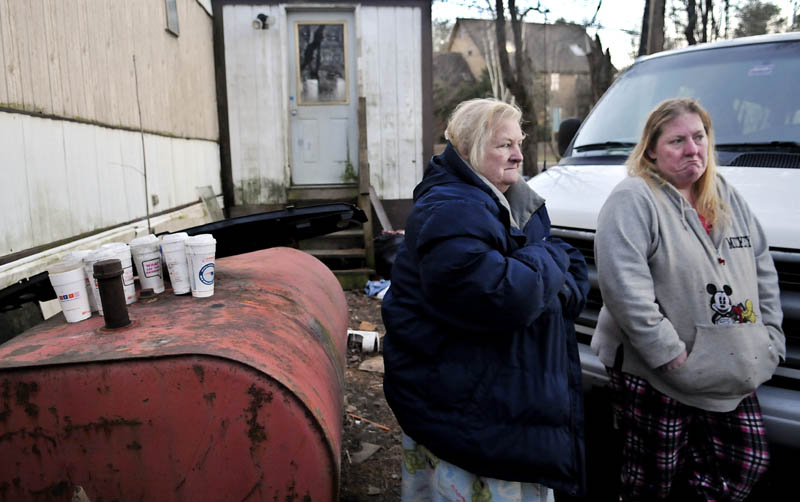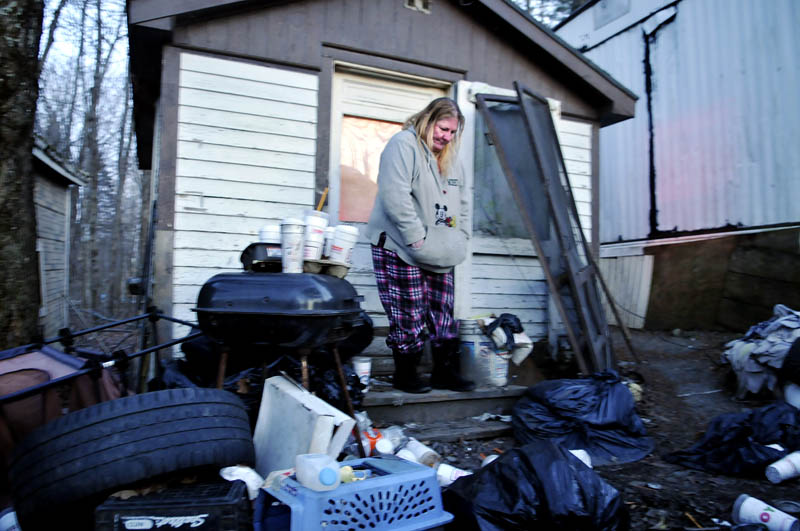CHINA — Judith Farris and her daughter Becky Ratcliff know their home isn’t pretty.
As they stood outside at twilight among black trash bags, a pile of tires, and dozens of empty Dunkin’ Donuts coffee cups, they complained that town officials have pestered them for years to clean up the property. They say neighborhood dogs tear into their trash and the garbage man stopped coming. While there are holes inside the trailer, they say they have been patched with boards that are unattractive, but functional.
“If you look, we’re poor people in a rich people’s neighborhood,” Ratcliff said. “It’s better than living under a bridge or in the cars. It’s just not pretty.”
China Lake is visible not far in the distance, and the neighborhood features tidy summer cottages and year-round homes neatly decorated for the holidays.
Yet town officials say their living arrangement is more than ugly — it’s dangerous.
The town has asked a Superior Court judge to sign an order to allow the town to tear down the trailer and two outbuildings because the structures have been deemed unsafe.
It’s relatively uncommon for towns to pursue court action against residents to have them removed and it’s used “only in situations of imminent danger,” said Kate Dufour of the Maine Municipal Association. Typically, she said local selectmen are able to draw up agreements to help improve the situation.
An inspection in May showed no running water, inadequate toilets, black mold and holes in the floor and ceilings. Farris, 70, shares the trailer with her 19- and 17-year-old grandsons, while her daughter and son-in-law sleep in a 10-foot-by-12-foot shed connected to the trailer by an electrical cord.
Farris’ home on Fire Road 60 near Village Street has been the subject of complaints by town residents for years, with a documented history of problems dating back to 2004.
Code Enforcement Officer Scott Pierz said he’s been to the property multiple times, and that the buildings are now beyond repair. He’s made attempts in recent weeks to find other housing for the family.
“My concern has been about a 70-year-old woman residing in a home and worrying about the conditions,” Pierz said. “Where does she go?”
Ratcliff said they would like to hire a lawyer to fight the town, but don’t have the money. If they are forced to move, they want to stay together as a family.
“Mom needs us,” she said. “Nothing was affordable that’s big enough for us. We asked if we could remodel and they told us no.”
Dogs, cats and a skunk
Although the town has ordered Farris to clean up junk from her yard for at least eight years, the latest issue began back in May when Farris went to the town to ask for help in repairing her hot water heater. Pierz brought along a team to inspect the property, including town Health Officer Alison Jorgensen.
“Upon entering the home, there was an extremely strong smell of ammonia from multiple cats and dogs urinating and defecating on the floor,” her report states. “The flooring was debilitated with holes where the ground under the home was visible. Black mold was present on the flooring in front of the sink in the kitchen and flooring appeared to be quite insubstantial to the point of concern of someone falling through the flooring.”
She notes that at the time of their visit, there was no running water in the home. Farris told Jorgensen that she hauled water from the lake to wash and drank water out of a nearby spring, according to the report.
On Thursday, Farris and Ratcliff said there is running water in the trailer now. A steady stream of water could be seen leaking from under the trailer.
Farris said she has five cats and a dog in the trailer, and Ratcliff keeps three cats and a dog in the shed, which has cable and Internet.
Farris also has a pet skunk in the garage, which the town describes in court documents as “dilapidated and deteriorating.”
Property matters
Pierz said he’s been working with Farris and her family for months to try to address the problem. In August, the China Board of Selectmen voted to order them to move no later than mid-October.
When they failed to do that, the town filed a Superior Court complaint Nov. 13.
A court hearing was held Nov. 26, but neither Farris nor anyone representing her interests attending the proceeding. Farris said the town did not notify her in advance of the hearing, and the court on Friday asked her to file something in writing expressing that concern by next Friday.
Complicating the situation is an unusual stipulation in the deed that prevents Farris from selling the property.
Farris inherited 51 percent of the property in 1998 following the death of her partner, Donald N. Thibodeau. In his will, Thibodeau described Farris as “my dearest friend and faithful companion, Judith Farris; who was always there to help me when I needed her.” Thibodeau gave 49 percent of the property to his son, Stephen R. Thibodeau, and stipulated that the “property cannot be sold to anyone, or to each other and must stay in joint ownership until the death of one of the owners.”
Thibodeau does not live on the property and town efforts to contact him have been unsuccessful. Efforts by the Kennebec Journal to contact Thibodeau, who is listed as living in Skowhegan on court documents, were also unsuccessful.
‘Beyond repair’
The history of town contact with Farris dates back to at least June 2004, when Pierz wrote her a letter informing her that her property fit the description of a junkyard and automobile graveyard as outlined in state law. It ordered her to clean up the property and provided her with information about a town “open transfer station day” where she could dispose of some of the materials.
Then, in May 2005, Pierz sent her another letter saying her property was subject to the state’s miscellaneous nuisance law, litter control law and possibly the junkyard and automobile graveyard statute.
In more recent times, Pierz said he has sent out plumbers and electricians to the property to try to make it livable.
But now, it no longer meets health and safety requirements, he said.
“The building is beyond repair,” he said. “It just can’t go on anymore.”
Susan Cover — 621-5643
scover@mainetoday.com
Send questions/comments to the editors.




Comments are no longer available on this story